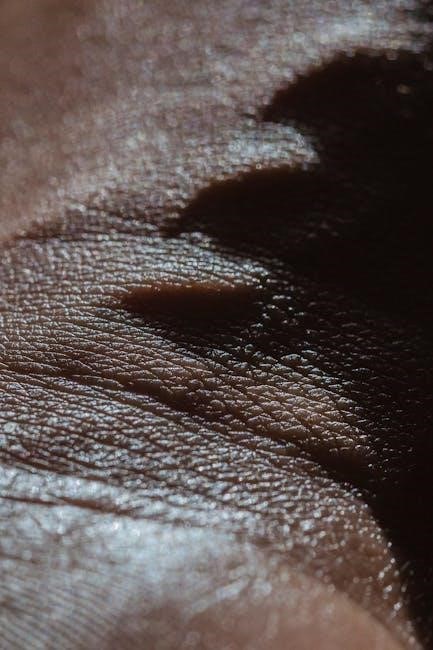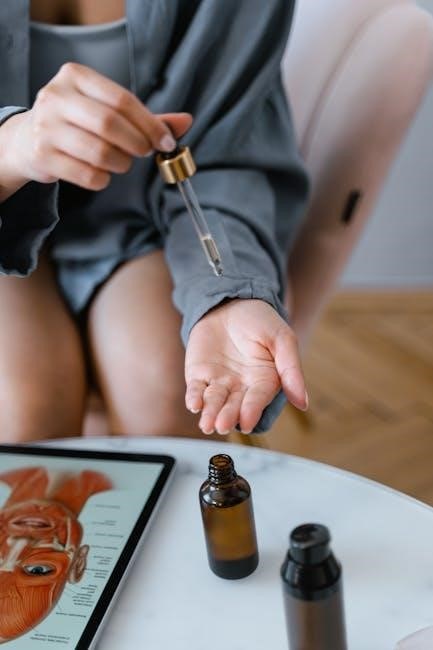Understanding Skin Health
Skin health is vital as it acts as the body’s largest organ, protecting against external factors. Maintaining its natural barrier, hydration, and protection is key for a healthy complexion.
The skin is the body’s largest organ, composed of three main layers: the epidermis, dermis, and hypodermis. The epidermis acts as a protective barrier, while the dermis contains collagen and elastin for elasticity. The hypodermis stores fat and connects skin to underlying tissues. Blood vessels and nerve endings in the dermis regulate sensations and nutrient delivery, essential for overall skin function and health.
The Importance of Skin Health
Skin health is crucial as it protects the body from external threats like pathogens and environmental damage. Proper care prevents conditions like acne and dryness, while promoting a radiant complexion. A consistent skincare routine, combined with professional treatments, enhances skin resilience. Healthy skin boosts confidence and overall well-being, making it a cornerstone of self-care and long-term health management.

Essential Skincare Routines
Consistent skincare routines are vital for maintaining healthy, glowing skin. They protect, hydrate, and rejuvenate, addressing specific concerns like acne or dryness while promoting overall skin well-being.
Morning Skincare Routine
A morning skincare routine sets the tone for the day, focusing on protection and hydration. Start with a gentle cleanser, followed by a serum for specific concerns like hydration or brightening. Seal with a lightweight moisturizer and finish with broad-spectrum sunscreen to shield against UV damage. This sequence helps maintain a balanced complexion and prepares skin for environmental exposure throughout the day.
Nighttime Skincare Routine
A nighttime skincare routine focuses on repair and rejuvenation. Begin with a cleanser to remove dirt and makeup, followed by a toner to balance pH. Apply a treatment product like retinol or hyaluronic acid for targeted benefits. Complete with a nourishing moisturizer to support skin regeneration overnight. This sequence helps restore and prepare skin for the next day, ensuring a refreshed and healthy-looking complexion in the morning.
Key Ingredients for Skin Health
Essential ingredients include retinol for anti-aging, hyaluronic acid for hydration, vitamin C for brightening, and niacinamide for balancing skin tone. These components promote healthy, radiant skin effectively.
Hyaluronic Acid and Its Benefits
Hyaluronic acid is a key ingredient in modern skincare, renowned for its ability to retain moisture and enhance skin hydration. It binds up to 1000 times its weight in water, maintaining the skin’s natural barrier and reducing the appearance of fine lines. Suitable for all skin types, including sensitive and oily skin, it strengthens the skin’s texture without clogging pores. Regular use in serums or moisturizers can improve elasticity and promote a radiant, youthful complexion effectively.
Retinol: The Science Behind Its Effectiveness
Retinol, a derivative of vitamin A, is scientifically proven to promote cell turnover, reducing fine lines and wrinkles. It enhances collagen production, improving skin elasticity and texture. Retinol also unclogs pores, preventing acne, and fades hyperpigmentation, offering a more even tone. Though it may cause initial irritation, consistent use in night routines yields noticeable anti-aging benefits, making it a cornerstone in advanced skincare regimens for long-term skin rejuvenation and health.
Nutrition and Skin Health
A balanced diet rich in vitamins, minerals, and antioxidants supports skin health, boosting collagen production and hydration, while protecting against environmental damages and promoting a radiant complexion naturally.
Dietary Recommendations for Glowing Skin
A diet rich in fruits, vegetables, lean proteins, and omega-3s supports skin health. Incorporate antioxidants like berries and leafy greens to combat free radicals. Stay hydrated with water and herbal teas to maintain moisture. Avoid processed foods and excess sugar, which can trigger inflammation and breakouts. Nuts and seeds provide essential fatty acids for a radiant complexion. A balanced diet helps address skin concerns like acne and dryness effectively.
The Role of Vitamins in Skin Health
Vitamins are essential for maintaining healthy skin. Vitamin C boosts collagen production, while vitamin E protects against UV damage. Vitamin D supports skin cell growth, and vitamin A helps regulate oil production. B vitamins, like niacinamide, improve skin elasticity and reduce inflammation. Vitamin K aids in wound healing and reduces dark spots. Incorporating these vitamins into your diet or skincare routine promotes a balanced and radiant complexion, addressing various skin concerns effectively.
Protecting Your Skin from Environmental Factors
Environmental factors like sun exposure and pollution can cause significant skin damage. Protecting your skin with sunscreen, antioxidants, and proper care is essential for maintaining its health and appearance.
The Impact of Sun Exposure on Skin
Sun exposure is a major environmental factor affecting skin health. UV rays can cause premature aging, dark spots, and even skin cancer. Prolonged exposure damages the skin’s elasticity, leading to wrinkles. Sunburns are immediate consequences, while long-term effects include increased risk of skin cancer. Protecting the skin with sunscreen, hats, and protective clothing is crucial to mitigate these harmful effects and maintain healthy, youthful skin.
Minimizing Damage from Pollution
Pollution exposes skin to harmful particles, causing inflammation and premature aging. To combat this, use products rich in antioxidants like vitamin C and E to neutralize free radicals. Incorporate cleansing brushes or detox masks to remove pollutants effectively. Moisturizers with anti-pollution properties can create a protective barrier. Regular exfoliation helps eliminate toxin buildup, while sunscreen adds an extra layer of defense against environmental stressors and UV rays.

Common Skin Concerns and Solutions
Addressing skin issues like acne, dryness, or sensitivity requires tailored approaches. Using targeted ingredients and consulting dermatologists ensures effective, personalized care for optimal skin health and appearance.
Acne: Causes and Treatments
Acne arises from clogged pores due to excess oil, dead skin, and bacteria. Treatments include topical creams like salicylic acid or retinol, and oral antibiotics for severe cases. Dermatologists often recommend tailored routines, while products from brands like The Ordinary offer effective solutions. Regular skincare and avoiding harsh products can help manage acne, promoting clearer, healthier skin over time.
Dry Skin: Management and Care
Dry skin, often caused by environmental factors or harsh products, requires gentle care. Moisturizing with hyaluronic acid and ceramides helps retain hydration. Avoiding hot showers and using humidifiers can prevent dryness. Skincare routines should focus on nourishing ingredients, while exfoliating sparingly to avoid irritation. Consistency and avoiding over-washing are key to maintaining soft, hydrated skin throughout the year.
Advanced Skincare Treatments
Advanced skincare treatments involve cutting-edge technologies and ingredients to address specific concerns. From laser therapy to chemical peels, these methods offer tailored solutions for achieving healthier, radiant skin.
Laser Therapy for Skin Rejuvenation
Laser therapy is a non-invasive treatment that uses focused light to target skin concerns like wrinkles, scars, and pigmentation. It stimulates collagen production, promoting a smoother, more even-toned complexion. Various laser types cater to different skin types and issues, offering customizable solutions for rejuvenation. This advanced method is popular for its effectiveness and minimal downtime, making it a favorite in modern skincare routines.
Chemical Peels: What You Need to Know
Chemical peels are a popular cosmetic treatment that exfoliates the skin using solutions like glycolic acid or salicylic acid. They help reduce fine lines, acne scars, and hyperpigmentation by stimulating collagen production. Available in varying strengths, peels cater to different skin types and concerns. While results are noticeable, multiple sessions are often needed for optimal outcomes, making them a versatile option for achieving radiant, smoother skin.

Maintaining Skin Health Over Time
Consistency is key to long-term skin health; Regular routines, sun protection, and a balanced lifestyle ensure sustained radiance and resilience against environmental and internal stressors over the years.
The Role of Sleep in Skin Regeneration
Sleep is critical for skin regeneration, as it allows the body to repair and rejuvenate skin cells. During deep sleep, collagen production increases, reducing wrinkles and improving elasticity. Hyaluronic acid levels rise, enhancing hydration. Poor sleep disrupts this process, leading to dullness and accelerated aging. Prioritizing 7-9 hours of quality sleep nightly supports long-term skin health and maintains a radiant, youthful complexion.
Stress Management for Healthy Skin
Chronic stress can negatively impact skin health by increasing cortisol levels, which may lead to acne, inflammation, and accelerated aging. Effective stress management techniques, such as meditation, yoga, and deep-breathing exercises, help regulate hormones and promote skin balance. A calm mind contributes to a clearer complexion, reducing breakouts and enhancing overall skin resilience. Prioritizing mental well-being is essential for maintaining healthy, radiant skin over time.

Sustainable Skincare Practices
Sustainable skincare involves using eco-friendly products, reducing waste, and supporting ethical brands. It promotes environmental responsibility while maintaining skin health, ensuring a greener future for beauty routines.
Eco-Friendly Skincare Products
Eco-friendly skincare products are formulated with natural, sustainable ingredients and minimal packaging. They reduce environmental impact while promoting healthy skin. Look for brands using recyclable materials, cruelty-free certifications, and organic extracts. These products not only benefit the planet but also offer effective, gentle care for various skin types, aligning with modern values of sustainability and ethical beauty practices.
Reducing Waste in Your Skincare Routine
Minimizing waste in skincare involves choosing multi-use products, buying in bulk, and recycling packaging. Opt for refillable containers and avoid single-use items. Select products with minimal, recyclable packaging to reduce environmental impact while maintaining effective skincare. Simple changes can make a significant difference in sustainability without compromising skin health.
Common Misconceptions About Skin Health
Many myths surround skin health, such as the belief that natural products are always safe. Truth is, even natural ingredients can cause irritation or allergic reactions. Awareness is key to proper care.
Debunking Myths About Skincare
Many skincare myths persist, such as the belief that expensive products always yield better results; In reality, effectiveness depends on ingredients, not price. Another myth is that natural products are inherently safe, but even natural ingredients can cause irritation. Additionally, the idea that you can “detox” your skin is unfounded, as the skin’s cleansing process is naturally managed by the body. Awareness of these myths helps guide better skincare choices.
Separating Fact from Fiction in Skin Care
Separating fact from fiction in skincare is crucial for effective routines. While some believe natural ingredients are always safe, others think pricey products guarantee results. However, skin responsiveness varies, and proven ingredients like hyaluronic acid and retinol often outperform untested trends. Personalized routines and expert advice are key, ensuring choices align with individual needs rather than unfounded claims.
